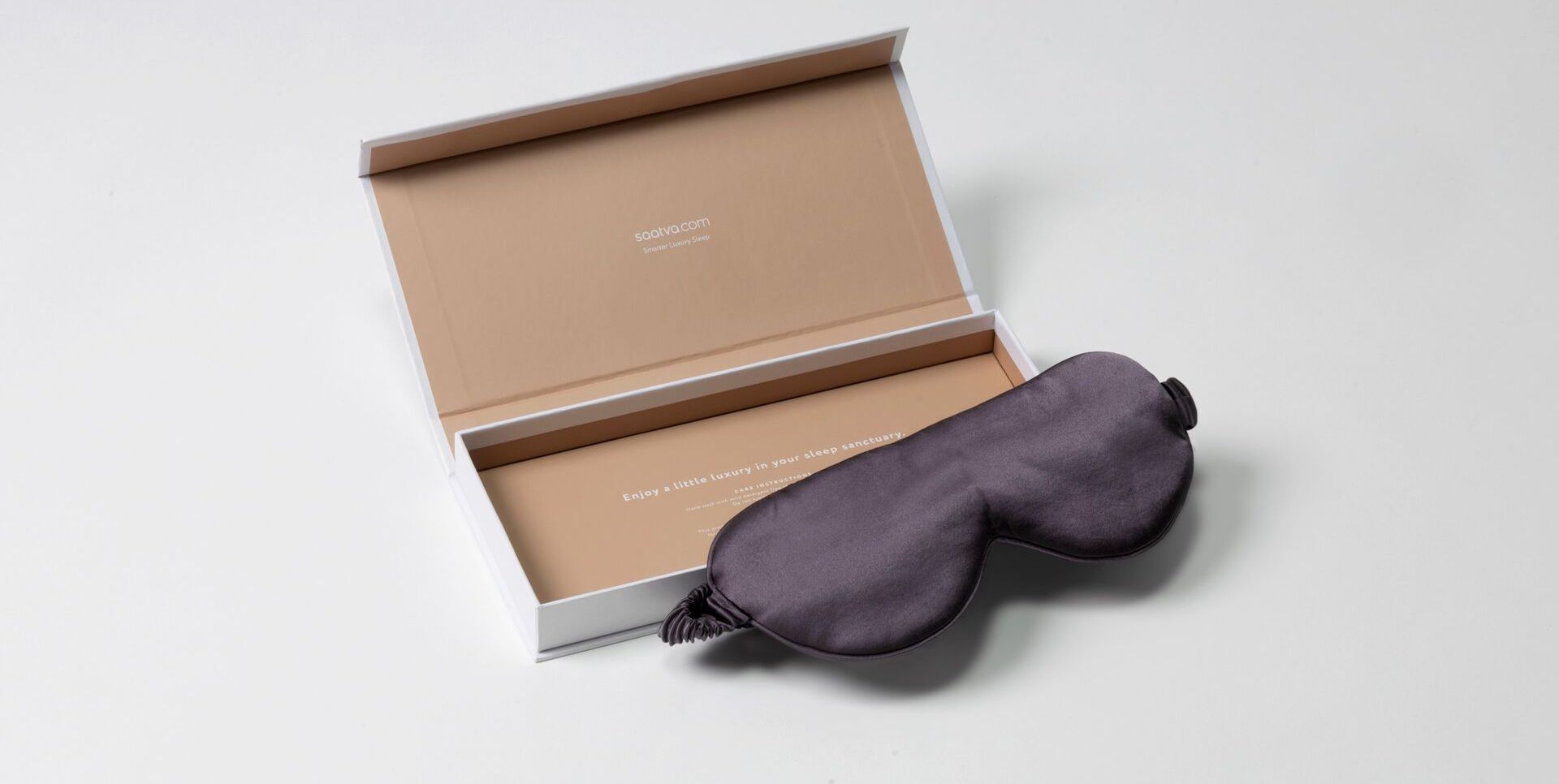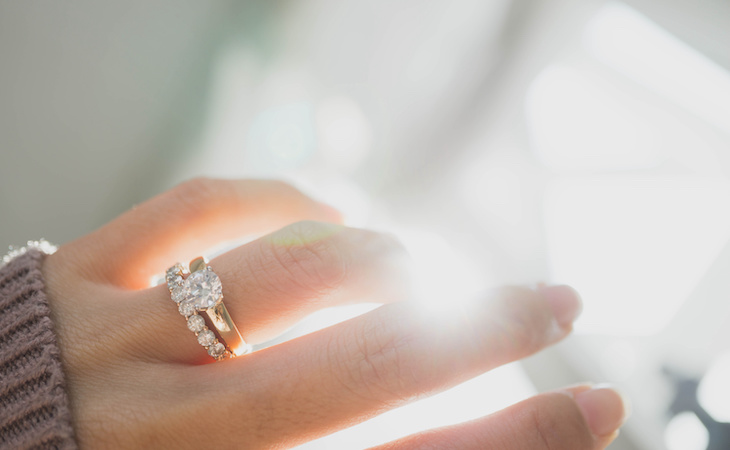There are a lot of factors that go into a good night’s sleep. Think of things like lighting (cue the

Blocks out light for restful sleep while protecting the delicate skin around the eyes
), temperature, and sounds. Even what you wear to bed can affect how well you sleep. That includes items like jewelry.
You may be wondering whether it’s OK to sleep in certain forms of jewelry or if it can be dangerous. You may even find yourself asking questions like: “Can you sleep in jewelry?” or, “What kinds of jewelry can you sleep in?”
This article will explore what you need to know about sleeping in specific jewelry types so you can make an informed decision for you and your sleep health. (Even the health of your jewelry!)
Can you sleep in jewelry? Weighing the pros and cons
Can you sleep in jewelry? When it comes to sleeping in jewelry, the simple answer is yes, you can do it. Below, we’ll weigh the general pros and cons before getting into specific types of jewelry.
Pros of sleeping in jewelry
Sleeping in jewelry is convenient as it saves the hassle and time of putting it on every morning and taking it off every night, especially if it’s difficult to get on and off in the first place.
Sleeping in jewelry also minimizes the risk of losing it. If you don’t have a nightstand essential, like a jewelry bowl or plate, you may forget where you put your jewelry after taking it off.
By never removing your jewelry, the chances of you losing it are pretty slim. Plus, jewelry can withstand normal wear and tear so the chances of damaging it while you sleep are relatively minimal.
Cons of sleeping in jewelry
However, there are some cons if you’re sleeping in jewelry. From anklets to bracelets, from earrings to rings, you run some risks if you decide to wear jewelry to bed.
First, jewelry can easily get caught in bedding, blankets, and pajamas. It can even become tangled in your hair if you have longer locks. This can cause jewelry to easily become damaged, knotted, and stretched.
By sleeping in jewelry, you also run the risk of losing jewelry altogether. Maybe you unconsciously take it off in the middle of the night or it gets lost in bedding, blankets, and pillowcases eventually making its way to the laundry never to be seen again.
It can even slip in between hard-to-reach places such as between the box spring and mattress or behind the headboard.
Some jewelry may even cause allergic reactions, bruises, general discomfort, indentations, rashes, scratches, and skin irritation from prolonged wear.
If you’re warm and sweating, your skin may expand making your jewelry feel tighter and more uncomfortable around your skin. Bacteria from sweat may even build up around your jewelry.
Certain jewelry pieces can even injure you. Rings may scratch you, layered necklaces can choke you or easily tangle, and earrings may poke you. You also risk damaging pierced ears by getting earrings snagged, ultimately stretching out the piercing site. (Ouch!)
Lastly, jewelry collects debris from the day including dirt, grime, oil, and sweat, which can then be transferred to your nice clean bed sheets. (Yuck!)
The bottom line on sleeping in jewelry is that although it may seem convenient, it can create an uncomfortable night of sleep leading to a disrupted night’s rest and a tired morning the next day.
Can you sleep in gold-plated jewelry?
Wondering if you can sleep in gold-plated jewelry or jewelry with gemstones, specifically? You may want to think twice.
Sleeping in these types of jewelry may compromise the metals and precious gemstones, ultimately affecting their longevity and luster.
Should you sleep in your wedding ring?
Next topic: to sleep in a wedding ring or not? “Overall, if the ring is comfortable and properly sized, sleeping in it should pose minimal risks to you or the ring itself,” says Mandy Hegedus, director of marketing at Silpada.
Unless your wedding ring causes irritation with prolonged wear, you’re probably good to go when it comes to wearing it overnight. However, if you do notice irritation, then you may want to give your finger a break at night.
If you haven’t yet chosen a wedding ring, then consider hypoallergenic jewelry when you’re ready to look for one. (All of Silpada’s silver jewelry is hypoallergenic, for example.)
Hypoallergenic jewelry is less likely to cause irritation or allergic reactions during prolonged wear, like while you’re sleeping.
Can you sleep with earrings in?
Earrings are a popular piece of jewelry. We even wrote about how to sleep with new ear piercings.
But what if you’ve had your ear piercings for a while: Should you sleep with earrings in? In most cases, you’ll want to avoid sleeping with earrings in.
Earrings, especially dangling earrings, can easily get snagged and tangled in bedding. Not only can this damage your bedding and earrings but your pierced ears as well.
It’s not only dangling earrings that can be jewelry culprits either. Even stud earrings that are the most basic in design can cause issues as their posts can poke into the sides of your head directly behind your ears. This, of course, is especially problematic for side sleepers.
Earrings can also fall out unnoticed. Backs of earrings are so small—what if they accidentally end up in your mouth and you wake up coughing and choking?
Losing a cherished piece while you sleep can be heartbreaking, particularly if it holds sentimental value. Let’s also not risk your life for the sake of jewelry.
Are there any kinds of earrings to sleep in that are safe for you and your ears even throughout the night, though?
“Certain types of earrings are particularly suitable for sleeping in, especially when crafted from sterling silver,” says Hegedus. “Small studs with smooth, rounded edges or small huggie hoops are ideal choices for overnight wear as they minimize the risk of discomfort or irritation.”
Best jewelry to sleep in
- When it comes to sleeping in jewelry, is there any jewelry designed to be slept in? There are three brands, in particular, including Groove Life, K’Lani Hair Tie Bracelets, and Pura Vida Bracelets.
Groove Life makes silicone rings so they won’t poke or snag anything in the middle of the night. - K’Lani Hair Tie Bracelets creates beautiful sets of bracelets that double up as hair ties, yet no one would even know by their unique designs resembling that of real jewelry.
- Pura Vida Bracelets makes gorgeous jewelry products handcrafted by artisans using high-quality threads, making many of their products safe for sleep.
FAQs
Can you sleep in real jewelry?
Yes, you can sleep in real jewelry. After all, it’s convenient, minimizes the risk of losing it, and saves you time every day. However, sleeping in jewelry does have some drawbacks.
Is it safe to sleep in necklaces?
Sleeping in necklaces should be avoided as they can easily get caught in bedding, blankets, and pajamas. They can even become tangled in your hair if you have longer locks.
This can cause jewelry to become damaged, knotted, and stretched. Layered necklaces can even choke you or easily become tangled, leaving you with one giant knot of a necklace.
Is it OK to sleep in a necklace 24/7?
“While sterling silver necklaces, in particular, are generally safe for everyday wear, sleeping in them 24/7 may not be advisable,” shares Hegedus. “Constant friction and pressure against the skin during sleep can lead to discomfort, skin irritation, or even tangling.”
However, wearing a silver necklace during the day and removing it before bedtime can help maintain its integrity and minimize the risk of damage or discomfort, she adds.
Can I sleep with a gold ring on?
“Sleeping with a gold ring can be safe and comfortable for many individuals, depending on personal preferences and the specific characteristics of the ring,” notes Hegedus. “Gold is a durable metal, making it suitable for extended wear without significant discomfort or damage.”
Keep in mind that factors such as ring size, design, and personal comfort levels should be considered. “Overall, if the gold ring is well-fitted and comfortable for sleeping, there should be no significant risks associated with wearing it overnight,” says Hegedus.
Is it safe to sleep in contact lenses? Here’s why you should take your contacts out before you go to bed.




